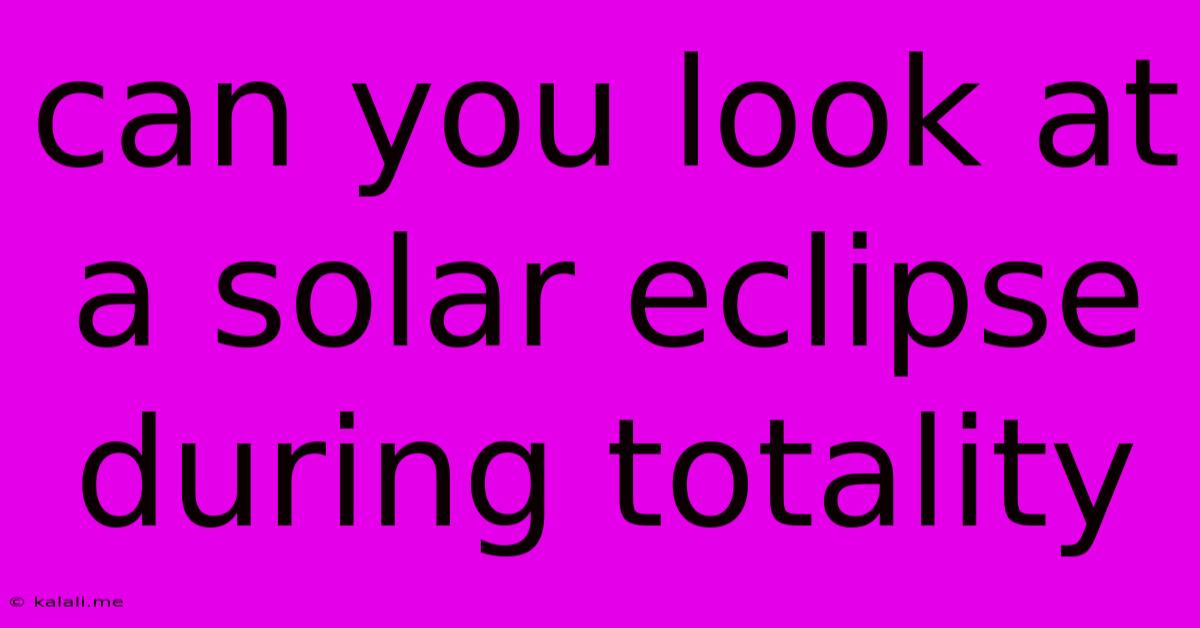Can You Look At A Solar Eclipse During Totality
Kalali
May 27, 2025 · 3 min read

Table of Contents
Can You Look at a Solar Eclipse During Totality? Yes, But With Caution!
Meta Description: Witnessing a total solar eclipse is a breathtaking experience, but safety is paramount. Learn when it's safe to look directly at the sun during totality and crucial precautions to take.
A total solar eclipse is a once-in-a-lifetime celestial event. The moon completely blocks the sun's disk, plunging the day into twilight and revealing the sun's ethereal corona. The burning question on many minds is: can you look at a solar eclipse during totality? The short answer is yes, but with crucial caveats. This article will explain why it's safe to look directly at the sun only during the brief period of totality and the vital safety measures you must take.
Understanding the Dangers of Looking at the Sun
Looking directly at the sun, even for a short period, can cause serious eye damage, including solar retinopathy, a condition that can lead to blurred vision, blind spots, and even permanent vision loss. The sun's intense radiation, even when partially obscured, is incredibly harmful to the delicate cells of your retina. This risk remains present during all phases of a partial eclipse.
Totality: The Safe Window
The only time it's considered safe to look directly at the sun during a solar eclipse is during the brief period of totality. This is when the moon completely covers the sun's disk, blocking all direct sunlight. During totality, the corona, the sun's outer atmosphere, becomes visible as a breathtaking halo. This is the only time your eyes are protected from the sun's harmful radiation.
Important Safety Precautions, Even During Totality
Even during totality, exercising caution is crucial. The moment before and after totality, the sun's intense light will reappear, posing an immediate risk to your eyes. Here's what you need to know:
- Know the timings: Precise timings for the beginning and end of totality are crucial. Consult reputable sources like NASA or your local astronomy club for accurate predictions specific to your viewing location. Don't rely on estimations.
- Use the eclipse as a signal: The sudden drop in ambient light and temperature is a natural signal that totality has begun. Observe carefully; even a sliver of the sun’s photosphere peeking out means you need to use your solar glasses again.
- Be ready to cover your eyes immediately: As soon as the sun starts to become visible again (the diamond ring effect), you must immediately put your solar viewers back on. The transition in and out of totality happens rapidly.
- Avoid looking through cameras, binoculars, or telescopes without the proper filters: These devices can magnify the sun's harmful rays, increasing the risk of eye damage dramatically. Special solar filters are designed for these optical instruments; using them without these filters is extremely hazardous.
Safe Viewing Methods During Partial Phases
During the partial phases of the eclipse, never look at the sun directly without proper eye protection. You should use ISO 12312-2 compliant solar glasses specifically designed for viewing solar eclipses. These glasses are readily available online or from reputable science museums and planetariums. Improvised methods like using sunglasses, smoked glass, or X-ray film are absolutely unsafe and should never be used.
Conclusion
Experiencing a total solar eclipse is an awe-inspiring event, but protecting your eyesight is paramount. Remember, looking directly at the sun during any phase other than totality is dangerous. By following these safety precautions, you can safely witness this magnificent natural phenomenon and create lasting memories without compromising your vision. Enjoy the celestial show!
Latest Posts
Latest Posts
-
How Do You Spawn A Villager In Minecraft
May 28, 2025
-
How Do I Find Average Speed
May 28, 2025
-
Bash Loop Through Files In Directory
May 28, 2025
-
What Do The Color Blue Mean In The Bible
May 28, 2025
-
How Many Pages Is In A Chapter
May 28, 2025
Related Post
Thank you for visiting our website which covers about Can You Look At A Solar Eclipse During Totality . We hope the information provided has been useful to you. Feel free to contact us if you have any questions or need further assistance. See you next time and don't miss to bookmark.